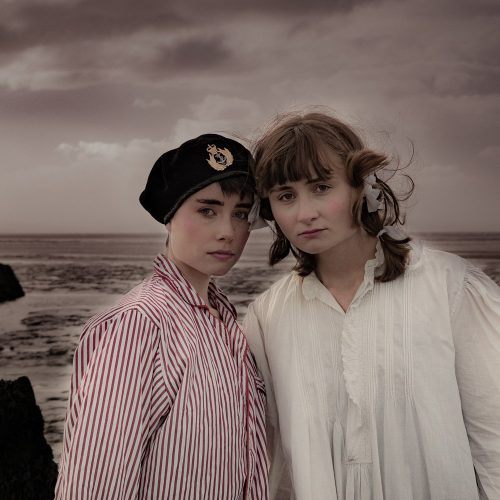A harmonium is a kind of keyboard known as a pump organ, operated with one hand pressing a pump to provide air while the other plays the keys. It produces a uniquely haunting tone: droning, wheezing and scraping, it sounds a little like an accordion turned inside out. The harmonium was a valuable instrument in classical and folk compositions alike, finding its way into a few songs by the Beatles and Elton John before the advent of electric keyboards allowed for the same sound without the cumbersome instrument itself. Nowadays, it’s primarily used in India, providing drones and melodies for pop and classical music.
“My Love Went To Sea,” a spellbinding new song by the British folk duo māsa, has a sound reminiscent of another prominent harmonium user: Nico, the German singer who went from the Velvet Underground and “These Days” to haunting, ancient-sounding avant-folk. “My Love Went To Sea” is certainly evocative in the same way as, say, The Marble Index; the second that harmonium whirs to life, it’s as though you’re standing on a rocky shore beneath an overcast sky, soaked by the briny mist of the waves. But thankfully for those who want to avoid existential crises, this song is considerably less grim than Nico. In fact, it’s downright stirring, possessing a mythical grandeur without losing sight of the human element.
Faron and Merle, the two sisters behind māsa, draw upon the folk tradition of seafaring lovers for this song, subverting the typical narrative in order to explore the limits of human connection. When the narrator’s love, a deep sea diver, departs for parts unknown, the narrator doesn’t pine on the shore for his return. Instead, she builds her own boat from “twigs and twine” and sets out on her own journey to find him. It tells us everything we need to know about this woman and her love for this diver, but it doesn’t do her much good: no matter how far she sails, no matter how long she sits on the edge of her raft, she can’t “get down to his depth.”
It might sound like a downer ending, but māsa turns it into triumph. A pulsing drum beats behind Faron and Merle as they harmonize, singing about floating through the “coral wasteland” for “all my living days” – and then they sing it again and again, growing louder and more intense: “for all my living daaaaays! For all my living DAAAAAAAYS!” They don’t sound happy about their fate, not exactly, but they don’t seem to think of it as a curse. If they have to float forever for a chance to find their love in the depths of the ocean, they’ll do it with a song in their heart.







